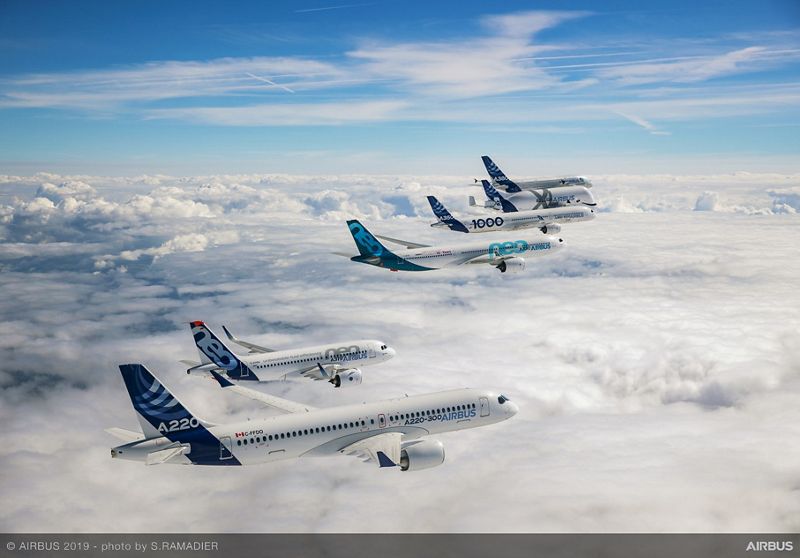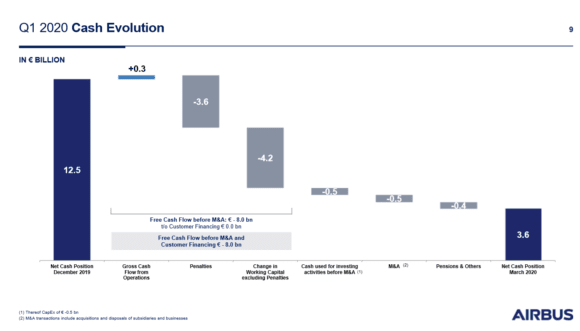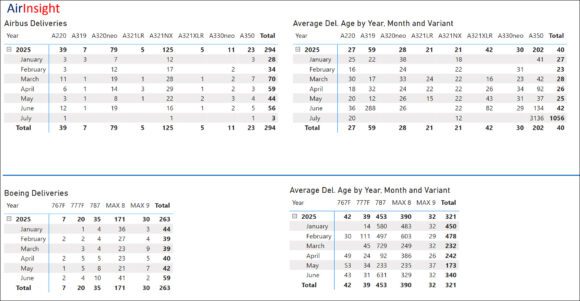
Airbus 50th years anniversary formation flight air to air 027
Airbus is still assessing the implications of the Covid-crisis on its outlook and hasn’t announced new measures yet to cope with the “gravest crisis the aerospace industry has ever known”, CEO Guillaume Faury said on April 29 at the presentation of the Q1-results. Preserving cash is one of the key priorities for now. If needed, Airbus will make additional changes to production rates around June when there is better visibility on the longer term.
In a letter to Airbus’ 136.518 employees, Faury last week had warned of the serious state the company is in as it is burning cash in unprecedented numbers that could bring the existence of the company at risk. Today, Faury’s tone was still somber and serious, but he showed confidence and resilience. “We are in the early stage of this crisis, we need to be humble. (…) We are in a complex and interdependent ecosystem with many parts, we try to keep these synchronized.”
Airbus recorded a EUR -481 million net loss in Q1, compared to a 40 million Group profit last year. Adjusted EBIT was EUR 281 million, down from 549 million. Revenues were down 15 percent to EUR 10.631 billion from 12.549 billion last year.
Consolidated EBIT of EUR 79 million (2019: 181 million) includes EUR 33 million in A380 termination costs, 134 million in dollar pre-delivery payment mismatch and balance sheet revaluation, and 35 million in other costs.
Adjusted EBIT Commercial Aircraft down 59 percent
By segment, Commercial Aviation saw Adjusted EBIT go down 59 percent to EUR 191 million from 463 million. Revenues were 22 percent lower at EUR 7.569 billion from 9.697 billion. EBIT Reported dropped to 57 million from 319 million.
Airbus sold 290 airliners in the January-March period versus 348 last year and delivered 122 compared to 162 the previous year. The backlog stood at 7.650 on March 31, but expect major revisions in April as many airlines and lessors will have revised and canceled their purchase plans.
As announced in April, production will be cut by about one-third. Rates of the A320neo will go down from 60 to 40 a month, of the A330/A330neo from 6 to 2, of the A350 from 10 to 6. Faury confirmed today that A220-production in Mirabel will remain flat at 4 a month, slightly below the planned output. Final Assembly of the A220-line in Mobile is set to open in May, as planned.
Synchronizing demand, supply, and production are critical, just as securing deliveries and managing the backlog. Airbus is focussing on suppliers that entered the crisis in a weak position to make sure they will be able to continue deliveries. “Especially suppliers that have already been hit hard by the grounding of the MAX are higher on our radar screen”, Faury said. “Q2 will be crucial to organize ourselves.”
Over 60 undelivered aircraft impact working capital
Faury’s worries about Airbus’ cash position were confirmed by CFO Dominik Asam. Net cash position has been reduced from EUR 12.5 billion on January 1 to 3.6 billion on March 31. Major factors here are the inclusion of EUR 3.6 billion in penalty costs from the bribery case.
More significantly is a change in working capital of EUR -4.2 billion. This consists of 60-plus aircraft that could not be delivered as airlines/lessors are unable to take them, either for financial reasons and for travel restrictions. Of these, 19 aircraft are for Chinese customers. Faury expects these numbers to go up in Q2 but reduce in Q3 as customers will be able to take delivery of them again, “but this is all prudent and as things stand now.”
Gross cash position is EUR 18.4 billion compared to 22.7 billion in Q1 2019.
Free cash flow before mergers and acquisitions ended at EUR -8 billion, down from EUR -4.3 billion last year. Without the penalty costs, free cash flow was at a similar level to last year, Asam stressed.
Early April, Airbus announced it has secured a new credit facility of EUR 15 billion. It also issued EUR 2.5 billion in bonds, partly terming out the credit facility. Capex will be reduced by EUR 700 million to EUR 1.9 billion as all non-critical activities have been either deferred or suspended.
Strong future for A321XLR
Faury is convinced people will keep an appetite for flying once the crisis will be over. He expects demand to focus on single-aisle aircraft like the A321XLR: “The XLR is particularly important as we expect to recover this segment ahead of the widebodies. It will be a very, very competitive plane for the post-Covid situation. At the moment, it is very difficult to say when this recovery will be. After the ramp-down, there will be a ramp-up and it could be very aggressive with single-aisles, but we are not yet at a point where we know where we are mid- and longterm.”
Ramping up again from rate 40 to 60 could be done rather quickly, Faury said. Going beyond rate 60 is another story, as it needs a better understanding of the market situation. Airbus has paused its investment in an additional A321neo-line in Toulouse, but “we will restart investments once we have a clearer picture”, Faury said. He also confirmed that production issues with the Airbus Cabin Flex-version “have been digested.”
“The threat is that Airbus is stuck in the crisis and is not able to compete again. That is something that we want to prevent, we keep investing in our products.”
Views: 3




